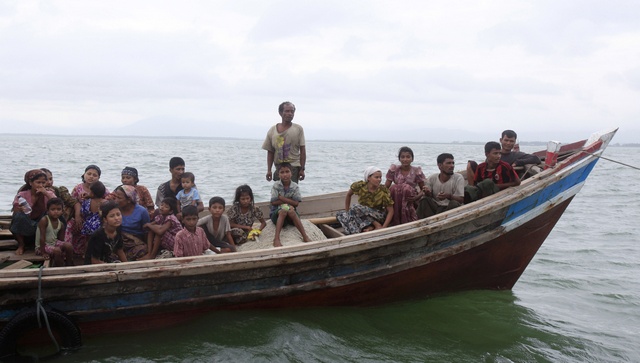Countries in the region need to try harder to find solutions to the problem of Rohingya people who have been forced to leave Burma and ended up victims of human trafficking gangs, a forum was told on Thursday.
Addressing a seminar on “Rohingya’s Solution for Better Protection” in Bangkok on Thursday, rights advocates said attempts to address the plights of the minority group in Burma’s Arakan State had to be made both from within and outside the country through regional collaboration.
Htay Lwin Oo, of the New York-based Civil Rights Movement for Burma, said there was strong evidence Rohingya had lived in Arakan State for 300 years before Burma was created and the Burmese government should accept that fact rather than attempting to drive them out from their homes.
ASEAN and the world community must not stand silent to the genocide against the Rohingya happening in Burma, he said.
Abu Tahay, a Rohingya MP candidate for the Union Nationals Development Party, said he would like to see Naypyidaw acknowledge the ethnic issue was a problem that needed to be solved politically and not through other means.
Mr Tahay also pleaded with Thailand and Bangladesh to lend further humanitarian assistance while trying to tackle the trafficking issue.
[related]
Abdul Kalam, chairman of the Rohingya Association of Thailand, called on the Thai military junta to work with Rohingya people to help solve the problem of illegal trafficking of Rohingya migrants.
“If [the Thai junta’s] perspective is widened by engaging more with the civil society, within three to six months the military leadership should be able to get rid of the trafficking networks in and outside Thailand,” he said.
“They have preyed on the Rohingya ummah [compatriots],” said Mr Kalam, also a long-time Rohingya resident in Bangkok.
He hoped the military regime would overhaul the system of labour management, registration and the legal status of all types of immigrants in Thailand.
Pol Col Prayuth Chommalee, deputy commander of Thailand’s Immigration Bureau’s Division 6, said the lack of a clear state policy on the Rohingya boatpeople has prevented state agencies from being able to tackle the problem of these illegal migrants.
He said although the number of Rohingya detained by his agency has dropped by half this year when compared to the same period last year, the bureau still needed help to take care of the migrants properly.
“With the Ramadan fasting approaching, we need to be more considerate of their halal food and religious activities,” he said.
Pol Col Prayuth said half of the 1,000 Rohingya now detained at immigration centres in the South have already been initially verified as Bangladeshis but documentation was still needed to provide final proof.
The officer said, however, the Burmese embassy has not participated in verification or deportation of these Rohingya.
While waiting for further verification of these illegal immigrants, the Immigration Bureau had paid some 14 million baht (US$440,000) on shelter, food and clothing without budgetary support from the National Security Council, he said.
Angkhana Neelapaijit, chair of Working Group on Justice and Peace, praised Thai authorities for providing shelter for the Rohingya and not immediately expelling them.
This article was originally published by the Bangkok Post on 27 June 2014.



